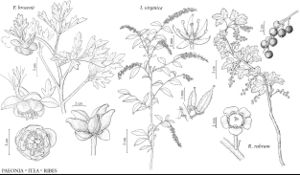Perennial herbs [shrubs], glabrous or hairy. Stems simple or branched, [± fleshy], ± scaly proximal to leaves proper; scales ± clasping, ± membranous. Leaves cauline, alternate, pinnately to ternately or biternately compound or divided; stipules absent; petiole present; blade sometimes ± leathery, ultimate margins entire or ± toothed. Inflorescences usually terminal, solitary flowers [2–3+ flowers in clusters]. Flowers bisexual; perianth and androecium perigynous; hypanthium absent; sepals [2–] 5–6 [–10+], distinct, unequal, ± leathery; petals [4–] 5–6 [–10+; –25+ in cultivars], distinct; stamens usually 50–200+, inserted on torus (sometimes called disc) interior to petals, distinct; anthers erect, basifixed, extrorse, dehiscent by longitudinal slits; staminodes absent, intrastaminal glands sometimes interpreted as staminodes; pistils [1–] 5 [–15], each 1-carpellate; ovary superior, distinct, 1-locular; placentation marginal; ovules anatropous, bitegmic, crassinucellate; styles 1 per carpel or ± absent; stigmas 1 per carpel, ± apical and adaxial. Fruits follicles, dehiscence adaxial. Seeds mostly 2–5 per carpel, dark-brown to blackish, ± cylindric to arcuate [globose], outer integuments relatively thick, sometimes interpreted as arils; embryo dicotyledonous, relatively small; endosperm oily.
Distribution
w United States, nw Mexico, Eurasia
Discussion
Genus 1, species ca. 30 (2 in the flora).
Paeonia was long included in Ranunculaceae or was associated with Dilleniaceae. Angiosperm Phylogeny Group (2003) placed Paeoniaceae in Saxifragales.
Selected References
None.
